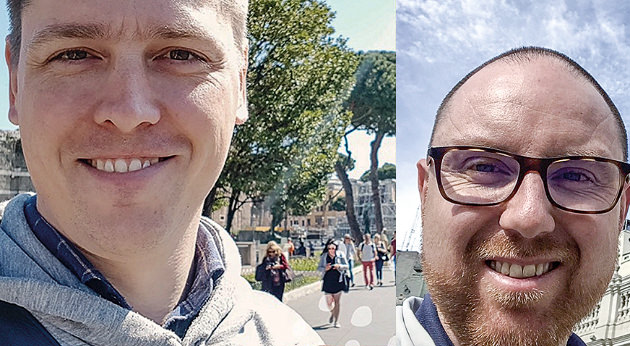When Simon Cowell started learning Italian at school as a child, he didn't imagine he would one day be living in the south of Italy teaching Christian university students to share Jesus with their friends.
But as he discovered more about Italian culture it didn’t take long to learn that, for many Italians, being Italian is synonymous with being Catholic. Having now spent seven years in Italy with CMS, Mr Cowell is hoping to share what he’s learned in a course he’s co-authored called Talking with Catholics about Jesus.
“Catholics are the single biggest non-evangelical group in Australia,” he says. Worldwide, there are more than 1.38 billion baptised Catholics, and in Australia Catholics make up almost 20% of the population.
“Even many atheists have a Catholic background. We want people to have conversations about Jesus with people from a Catholic background.”
Along with Chris Overhall, a CMS missionary living in Chile, and the Rev Mark Gilbert, who works with Certainty 4 Eternity, this course was created to help Protestants understand Catholics and have great conversations together about Christ.

Clarity and wisdom: Simon Cowell (left) in Italy and Chris Overhall in Chile.
The course is a combination of video material and workbook discussion questions, perfect for small groups and individuals to explore the beliefs of Catholic friends and family. A greater understanding of their worldview and identity is essential for fostering genuine connections and valuable conversations about Jesus.
Course details here.
We both believe in Jesus, but…
When Mr Overhall was young, a Catholic funeral taught him some of the key theological differences.
“As I went to the funeral, they didn’t have assurance. The gospel of the Bible came with assurance, but my Roman Catholic friends weren’t sure. They had purgatory and prayed to saints. Assurance was one thing that was different.
“I used to think if you could just get them to think that Mary wasn’t as important as Jesus, it would solve all the problems. But in writing this course, I’ve come to realise that Roman Catholicism doesn’t depend on one doctrine. It’s not a few differences. It’s actually the whole essence of the system that gives light to the problematic doctrines.”
Since 2018. Mr Overhall has worked in Chile, training people for ministry. When three quarters of the population identifies as Catholic, it’s vital that his students understand biblical doctrines.
“We are very conscious of being Protestant as opposed to being Catholic [here],” he says. “Helping future pastors and leaders think really hard about what is the gospel, who is Jesus, what is the church – Protestants and Catholics have very different answers. We might use the same words but mean different things.
“We need to have clarity so we can speak the truth in love, correct and be wise in how we work with other Christians in our areas.”
Catholicism around the world
- Australia has more than 5 million Catholics, representing 19.9 per cent of the population.
- The top five countries with the greatest percentage of Catholics, aside from Vatican City, include Timor-Leste (96.9 per cent, San Marino (90.5 per cent), Paraguay (89 per cent), Malta (88.7 per cent) and Andorra (88.2 per cent).
- There were more than 13.7 million Catholic baptisms performed around the world in 2021. More than 81 per cent of these were for children under 7.
- The Catholic Church recognises more than 10,000 saints. There is one recognised Australian saint: Mary MacKillop.
- Almost 20 per cent of students across Australia are educated in a Catholic school.
- From 2011-2021, 16.3 per cent of immigrants to Australia were from a Catholic background.
What I wish I knew when I was 20
Mr Cowell says conversations with Catholics can go a number of directions. His hope is that the course can “help people like me when I was 20, who might have had Catholic friends – some of whom were really active and theologically literate, and others for whom it was part of their identity but didn’t affect much of day-to-day life.
“Often it’s a conversation killer [when someone says] ‘Oh, I’m Catholic’. A helpful question to ask is, ‘What does that mean for you?’. I’d love for the course to help anyone who experiences that response to push into that further.
“Our prayer is that this course will help people to chat to their Catholic friends about Jesus. We hope that this will help people to do that and feel less awkward, confrontational and rude about doing it.”
Adds Mr Overhall: “I would love people to have a generous openness towards Catholics and not just get into [theological] fights. I don’t want people to think they’ve done their duty by getting into fights. I love people to build bridges with Catholics to have conversations about Jesus.
“Sometimes when we get involved with evangelism, we feel very inadequate if we don’t have the answers. I would love this course to train people to have good, gospel-soaked conversations to help their friends see Jesus in the clear teaching of the Bible rather than in what they’ve received in the Roman Catholic Church.”
Pray
- for Protestants to have a genuine curiosity towards their Catholic friends, that they would ask good questions and listen well in order to have great conversations about Jesus
- that Catholics, no matter how active in their faith, will be open to conversations about Jesus, encounter him clearly through the word and know his forgiveness for their sins, both now and forever
- that the course might be a helpful tool for Protestants to remove any incorrect assumptions about the Catholic faith, and help them understand the differences in doctrine






















